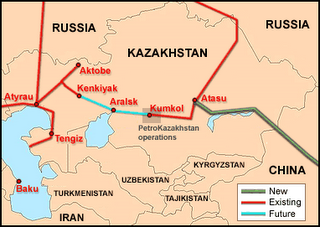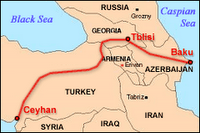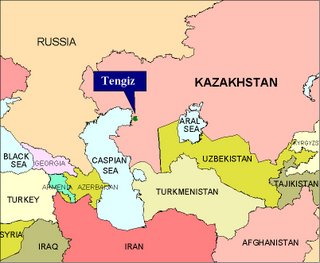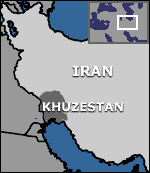
China lays down the Gauntlet in Energy War
F. William Engdahl
On December 15, the state-owned China National Petroleum Corp (CNPC) inaugurated an oil pipeline running from Kazakhstan to northwest China. The pipeline will undercut the geopolitical significance of the Washington-backed Baku-Tbilisi-Ceyhan (BTC)oil pipeline which opened this past summer amid big fanfare and support from Washington.

The geopolitical chess game for the control of the energy flows of Central Asia and overall of Eurasia from the Atlantic to the China Sea is sharply evident in the latest developments.

...China is reportedly considering asking Russian companies to help it fill the pipeline with oil, until Kazakh supply is sufficient.
...closer China-Kazakhstan-Russia energy cooperation - the nightmare scenario of Washington.
The new China pipeline runs 962 kilometers (598 miles) and will take China a third of the way to Kashagan in the Caspian Sea
Kashagan is the largest new oil discovery in decades and exceeds the size of the North Sea.

...a huge field offshore Kazakhstan southwest of Tengiz, has confirmed enormous oil deposits there.
In October, Beijing scored a second major geopolitical coup when China completed a $4.18 billion takeover of PetroKazakhstan Inc. It was, in a sense, revenge on Washington for the blocking of the China acquisition of Unocal. US oil majors had made major efforts to lock up Kazakhstan oil after discovery of major oil offshore in the Kashagan field. They failed. ExxonMobil
 was charged with bribery of Kazakh officials to win a presence in the Kazakh oil business, and a senior Mobil executive was later jailed on US tax evasion in New York tied to the Kazakh bribery payments.
was charged with bribery of Kazakh officials to win a presence in the Kazakh oil business, and a senior Mobil executive was later jailed on US tax evasion in New York tied to the Kazakh bribery payments.Now China has opened an oil flow out of Kazakhstan to the East, not the West.

This has major strategic implications for the future of the Washington-backed BTC oil pipeline. That pipeline was built by the Caspian Oil Consortium headed by British Petroleum
Its construction was undertaken on the assumption that it would carry not only Baku oil, but also a major share of Kazakh oil from Tengiz and offshore Kashagan oil fields. Oops!
At the end of 2004, Beijing signed a $70 billion energy agreement with Tehran,

...agreed to buy 250 million tons of LNG over 30 years from Iran, as well as to develop the giant Yadavaran field (located in Khuzestan)
A second phase in the Iran-China strategic energy cooperation will involve constructing a pipeline in Iran to take oil some 386 kilometers to the Caspian Sea, there to link up with the planned pipeline from China into Kazakhstan.
No comments:
Post a Comment